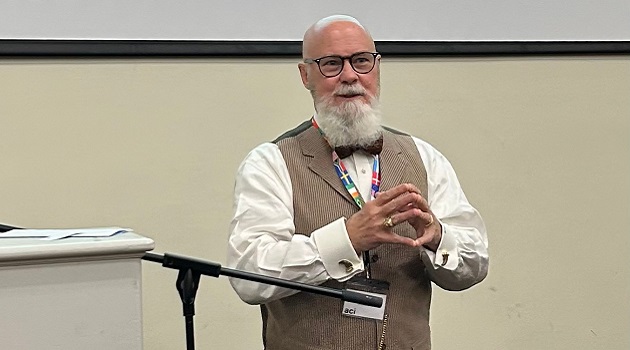Global Climate Change and the impacts of Desertification are addressed
By Chris Carter
Dr. Tom Mullikin, chair of the gubernatorially established S.C. Floodwater Commission and representing the University of South Carolina’s School of Hospitality and Tourism Management where he teaches, spoke to upwards of 100 guests from around the world attending (35 in attendance, another 80-plus who joined electronically) the 7th International Conference on Tourism Research in Cape Town, South Africa, Monday, March 18.
Speaking primarily about “Desertification” (defined as “the process by which fertile land becomes desert, typically as a result of drought, deforestation, or inappropriate agriculture”), Mullikin focused on “Challenges and Opportunities facing Ecotourism in Sub-Saharan Africa” as a result of desertification stemming from global climate change.
According to Mullikin, “Climate change fuels desertification with variability in temperature, rainfall, wind, and the strength of solar radiation. Ecosystems are changing, vegetation coverage is declining, soil erosion has increased, carbon sequestration is threatened, and human lives are endangered. “
He added: “As the climate changes, so do the interactions within the region such as land use, water use, land management, grazing patterns, and urbanization.”
As regards Sub-Saharan Africa (the vast fertile regions below the great Sahara Desert), Mullikin said, “Desertification poses a great threat to agriculture productivity, economic development, and soil protection. Crop productions have decreased over the years while poverty has increased,” adding, “The drylands in sub-Saharan Africa have very low vegetation coverage, leading to many soil problems, including erosion, landslide, diminished nutrients and surface soils, and water contamination. These issues are exacerbated by a lack of environmental policies, inadequate soil management, and socio-cultural events.”
Among the solutions proposed by Mullikin were the consideration of new government planning policies “based on the population, available resources, level of poverty, and utilization and development of adjacent lands.”
Mullikin also said: “Transition to more renewable energy sources in the area is recognized as a countermeasure to desertification. Sub- Saharan Africa was reported as having the highest dependence on traditional biomass for their energy sources, such as fuelwood, crop straws, and manure from livestock. By lowering the reliance on biomass sources, benefits include better socioeconomic trends and increased health trends.”
Increased extranational collaboration in terms of irrigation is also key.
“The sub-Saharan region in Africa was recorded as having irrigation covering only six percent of the cultivated areas,” Mullikin said. “When combating droughts, tackling the entire region of sub-Saharan Africa rather than by individual countries was found to be more cost-effective.”
Mullikin also addressed the importance of a vibrant ecotourism plan to include sound ecotourism governance, education, and planning for the future.
The international conference was hosted by the Centre for Tourism Research in Africa at the Cape Town Hotel School, Cape Peninsula University of Technology, South Africa.
Mullikin returns to South Carolina this week and continues planning, preparing, and conditioning himself physically for the forthcoming statewide SC7 Expedition from the mountains to the sea. The SC7 Expedition in May will be immediately followed by a trip to the mountains of Ecuador.
– Chris Carter is a former semi-pro football player and U.S. Air Force veteran whose articles have appeared in OpsLens, Human Events, Canada Free Press, Deutsche Welle, NavySEALs.com and other publications.



